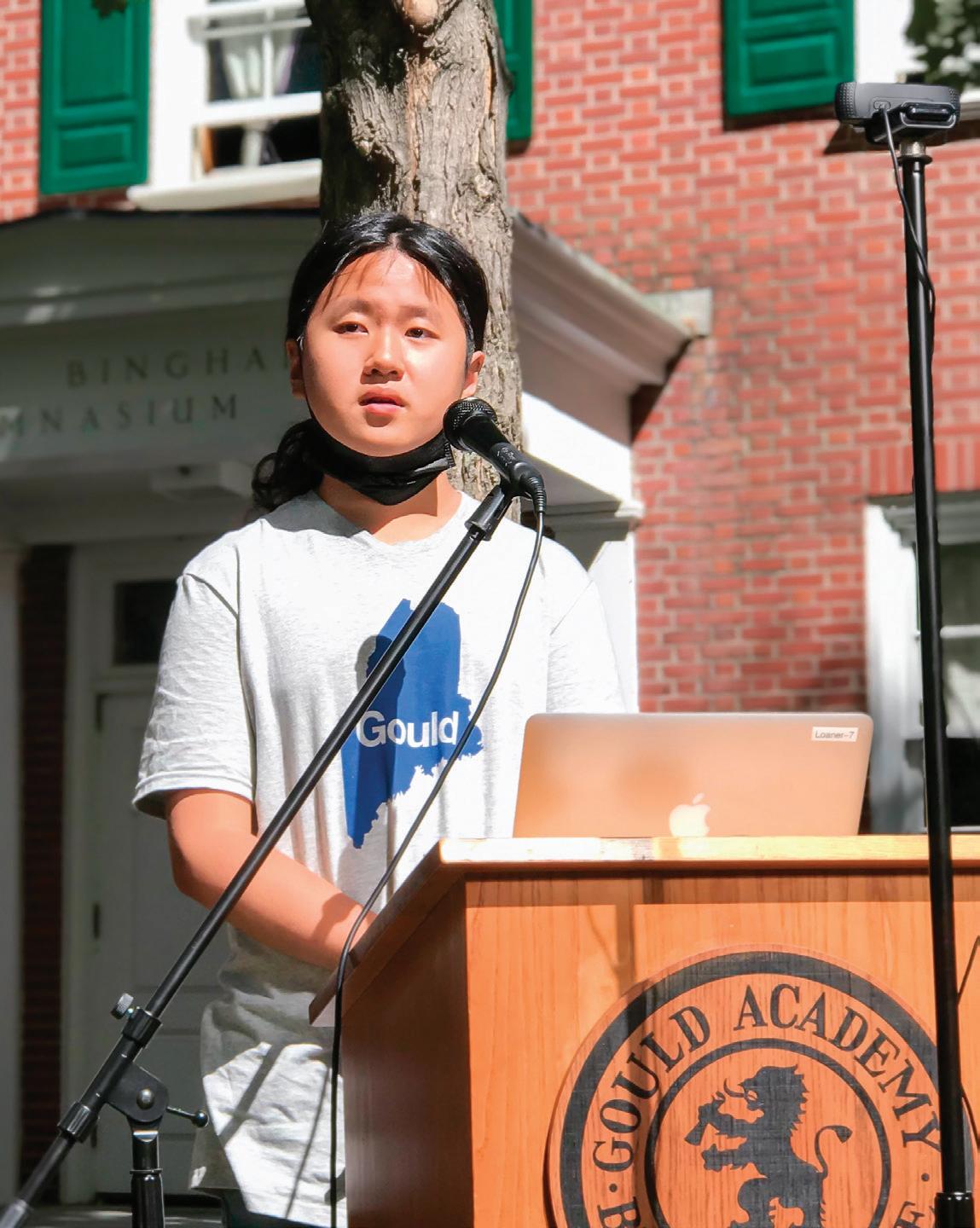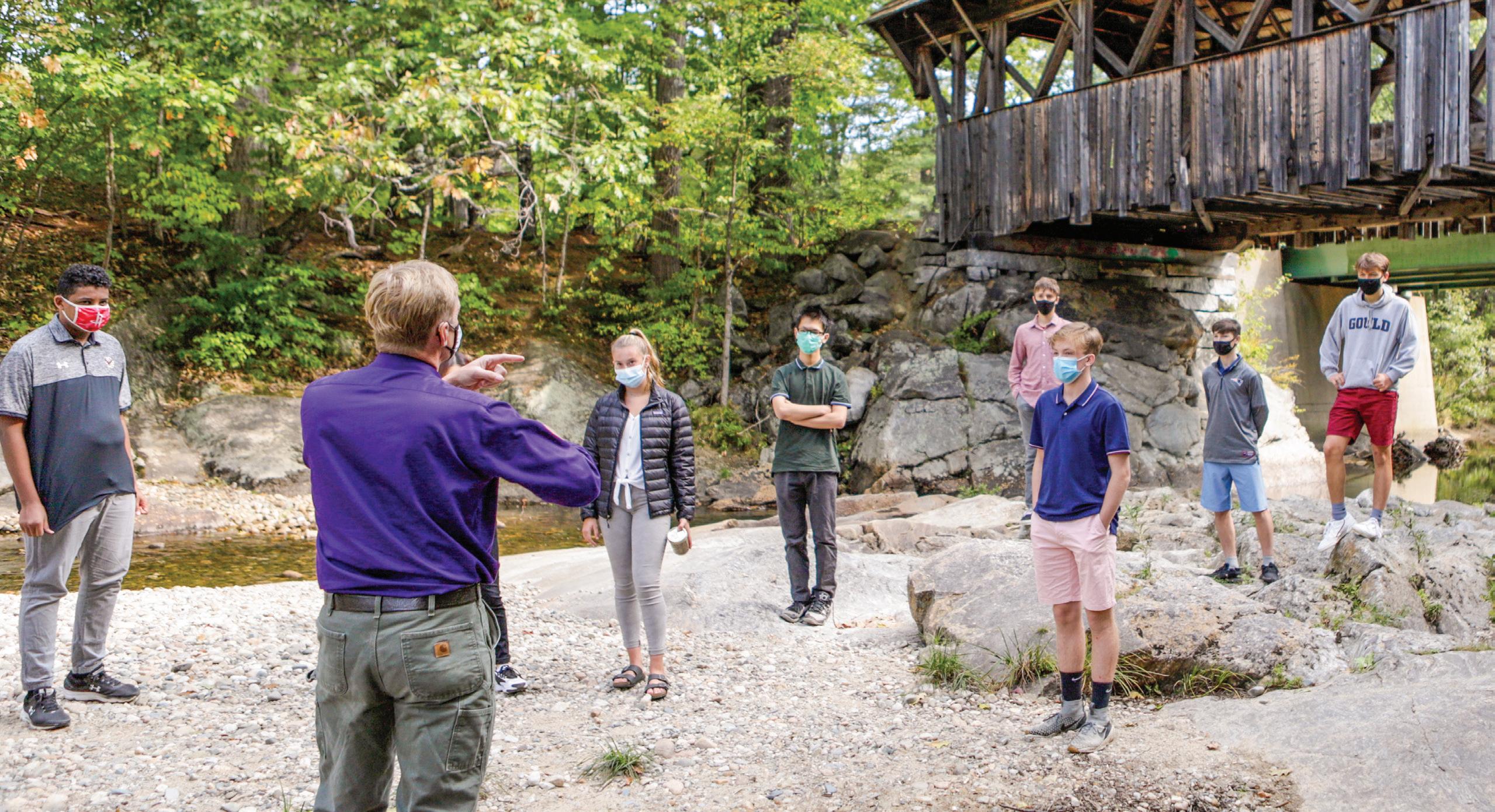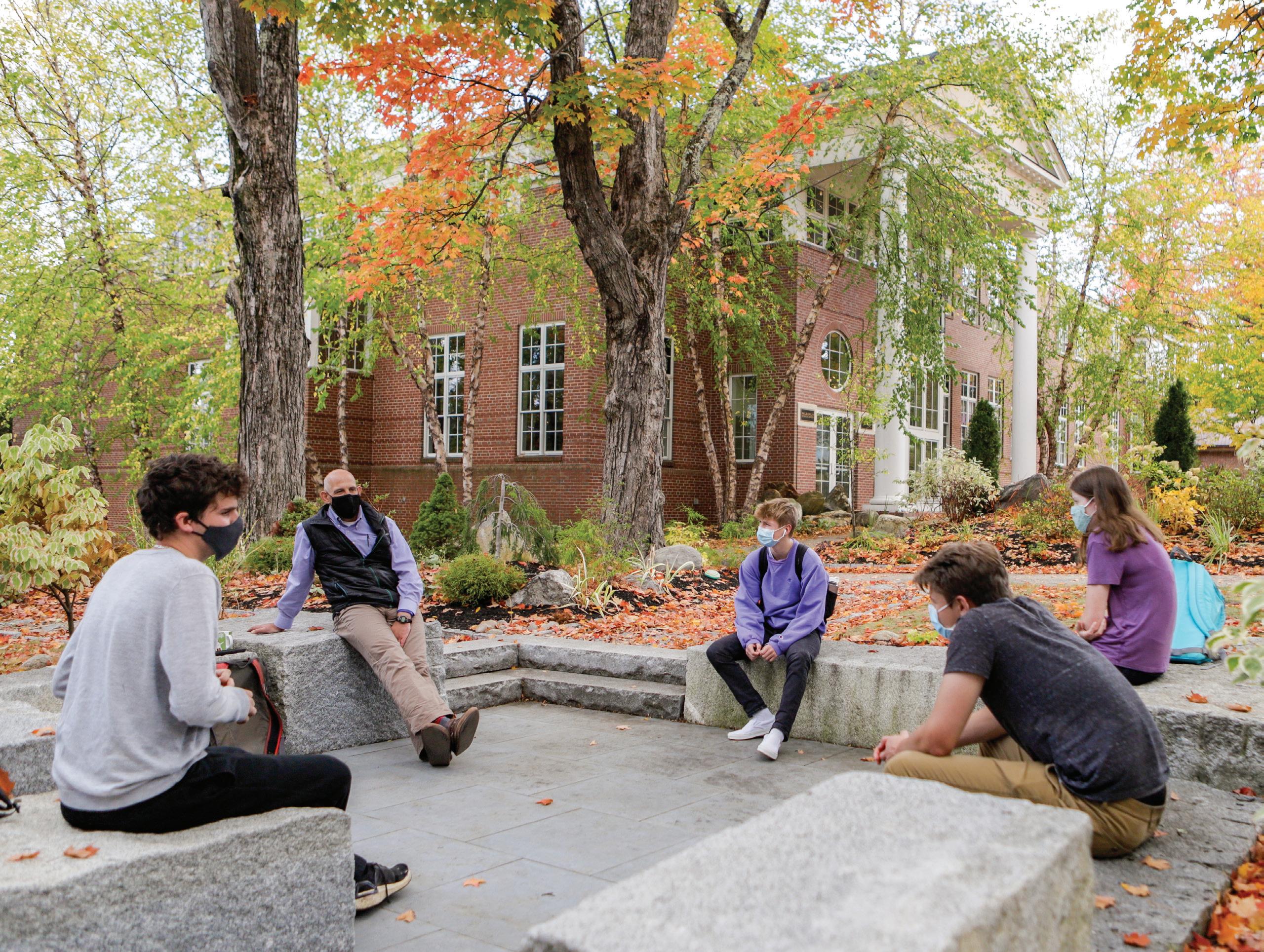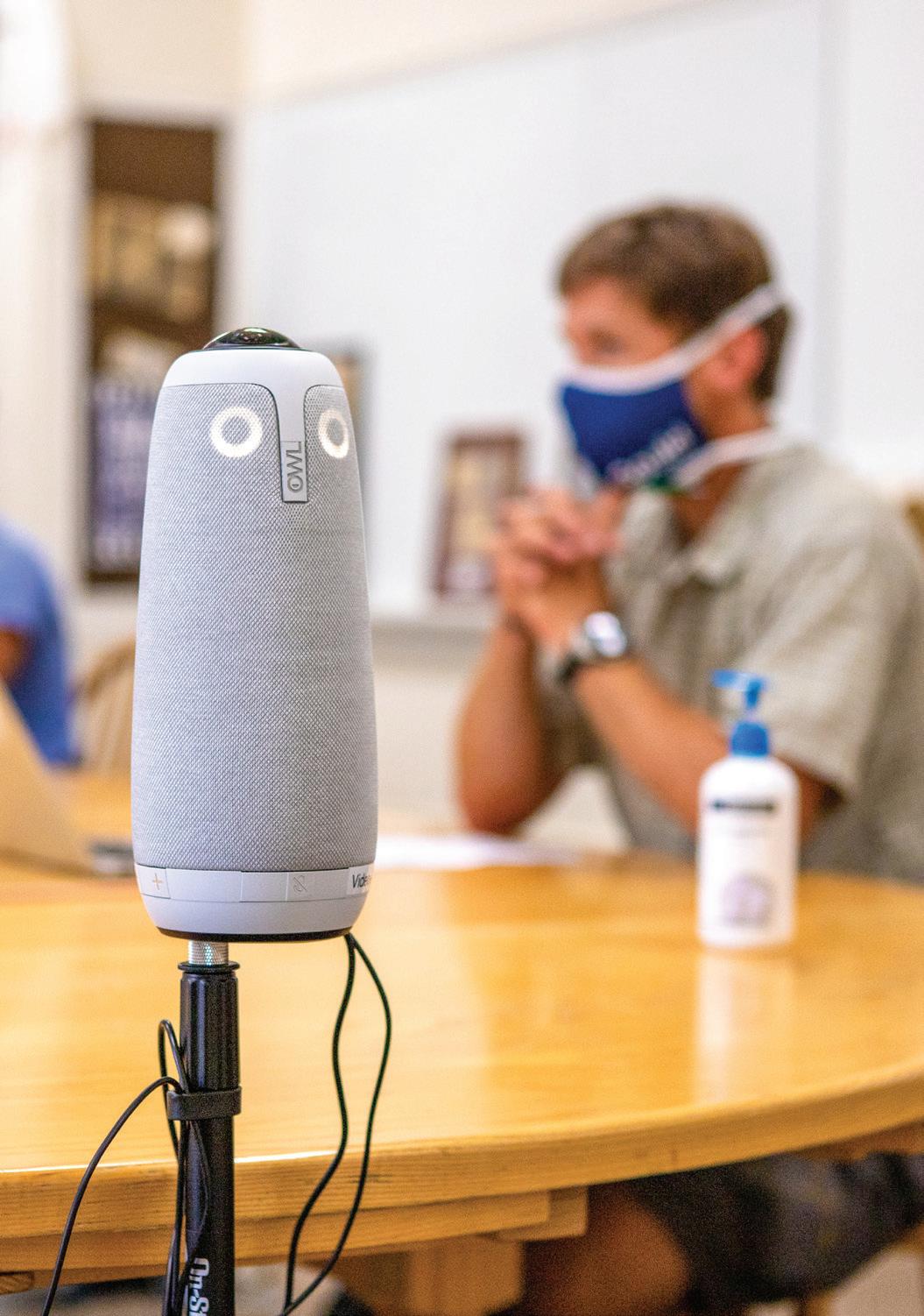
9 minute read
Campus Under COVID
CAMPUS UNDER COVID
This is a historic moment people will look back on generations from now—the first major pandemic in a century—and wonder what life was like at Gould. We write this story as much for them as for you, who are also living through this moment in time. by Julie Reiff
Advertisement
James Yao is at the podium as half the school gathers on the lawn and under a tent in the courtyard between Hanscom and Bingham. It’s a perfect early September day; a cool breeze from the mountains comes across the upper fields but the sun is strong enough to keep us warm. The other half of the school is “Zooming” the all-school orientation meeting from their homes or dorm rooms—because this school year is like no other. Gould is opening its 186th school year in the midst of the largest pandemic in a century.
I can think of no one more appropriate to address the community on this auspicious day. James, a four-year senior from Wuhan, China, is more than 7,000 miles from home and hasn’t seen his family in nearly a year. Like much of the audience, he hasn’t had a haircut in a while either. He is soft spoken and not a confident public speaker, but this is a topic he feels strongly about.
“At first I was really sad not to see my family,” James says, “I tried to ignore everything we’re facing and not care about the world, but that made me feel worse. Luckily I got through it. Everyone is going to face a big mental challenge in this kind of time. We need to face that and do our best to get through it as a community, and help others do their best.”
Just getting to this moment took months of planning by a task force that was assembled back in May. That group met daily throughout the spring and most of the summer, trying to find ways to reopen the school safely this fall.
Making a Plan
The spring term was difficult for all. The decision to send students home in March and stay remote through the spring was made easier by stay-at-home orders from the governor of Maine and the closure of all nonessential businesses, including Sunday River. When it became clear that the pandemic would still be with us in September, the Covid response team morphed into a Reopening Task Force (gouldacademy.org/about/ reopening2020) that released broad strokes of Gould’s plan in June and more details in mid-July. From then on, there were weekly emailed updates and Zoom “coffee chats” with parents; student leaders arranged Zoom meetings by class.
Beyond the logistics of how to bring everyone back safely, Assistant Head of School Brad Clarke led a group that looked at the teaching and learning process and how we could accommodate students who needed to study remotely, how we could de-densify classrooms, and how we might shift smoothly to a fully remote model if the need arose.
We added high-tech cameras that follow a speaker’s voice in the classroom to help make remote learners feel more a part of the discussion, whether they’re in Gehring or at home in Hong Kong. His group also focused on the essence of good teaching and added applied learning blocks to the schedule—longer periods that allow students to do more hands-on activities. Classes have used that time to cook a Roman meal over a campfire for history, to collect minerals from the Sunday River for chemistry, and to calculate a plan to build a roof for the new greenhouse.
Athletics has unique challenges this year as well.
James Yao, a senior from Wuhan, China, helped welcome the school back in September, having spent the entire spring and summer on campus.

James Yao ’21 addressing the Gould Community at the opening of school.
“Coaches and athletes have had to recalibrate their goals and their approach in order to find success,” says Athletic Director Bob Harkins. Running, mountain biking, and golf hosted asynchronous matches with other MAISAD schools, never meeting their opponents, but contact sports like soccer and field hockey focused on skill-building and played intramurally to get some game-time experience.

Todd Siekman’s chemistry class engages in a little applied learning at Artist’s Bridge near Sunday River, collecting samples they will later analyze at the Maine Mineral and Gem Museum.
“All is not lost,” Harkins says. “The shift away from competition has given athletes the opportunity to focus more on skill development and conditioning—a real bonus for younger, developing athletes. In a normal high school sports season, the window to work on developing their skill base is relatively short, maybe two to three weeks. In a season that is void of trophies or championships, this encourages athletes to focus intrinsically on their personal best. The result will be long-term benefits that will serve athletes very well going forward.”
Challenging times present new opportunities for leadership, and the Class of 2021 is rising to the challenge. Soccer teams created the Covid Cup, and field hockey challenged the faculty. Beyond athletics, Reachout dove into community service with gusto even if they couldn’t actually go into the community. They made and donated masks to the local elementary school, organized a pink dress-down day for breast cancer awareness, and created a Halloween scavenger hunt for faculty children who couldn’t go trick or treating.
What It’s Like to Be a Senior
But no matter how grateful students are to be back on campus and learning in person, there is no doubt that social distancing takes a toll.
Cassie, Eliza, and Lexi are prefects and live in the only triple room in Gehring. I checked in with them in late October, to see what senior year has been like for them so far.
They talk about some of their best moments—sitting outside without masks, socially distanced, biking over on Pine Hill or throwing a Frisbee around, having lunch on the Ordway porch with other seniors. “Even though we’re sprawled almost to the door, eating with our masks off,” says Cassie, “we’re laughing, and it feels normal.”
And that seems to be the key for most students—the moments here when life feels normal, for a little while. But they are honest, too, about how hard it has been.
“We know it’s not going to be normal for a really long time,” Cassie adds. “Everything is changing. We know it could be better, but we have to shift our minds, and some days all we want is to hug someone who isn’t a roommate—not that I don’t love these guys.”

Brett Shifrin meets with his class on the IDEAS Center patio.

Lauren Head moved her blacksmithing class outside to be more Covid compliant.
“I try to take it one day at a time,” says Eliza. “Honestly, my goal was to get to midterms, to have that break. My next goal is to get to Thanksgiving break and then to Christmas when I go home. We have absolutely no control over any of the variables that are affecting our lives, and if I spend my time worrying about what the rest of my senior year is going to look like, it’s going to be horrible. So I’m trying to take it one chunk at a time, to live in the moment as much as possible. No matter what, my senior year is going to be unique, and I’m going to remember it the rest of my life.”
As seniors, they are in the midst of applying to college, and as prefects they also feel the pressure to be on their best behavior and always remember to set an example for others, but it hasn’t been bad, they are quick to explain. Just hard.

Roommates Cassie Pyle ’21 and Lexi Ordway ’21 atop the Jordan summit at Sunday River on Mountain Day in October.
Eliza describes her long weekend. Between stints of homework and studying for APs, she went roller skiing out on the North Road. Five or six inches of snow fell overnight up in Grafton Notch, so a few members of the Nordic team went there to ski at 7 the next morning. The day after that she went surfing down on the coast with Mr. Smith and Mr. Hayward. “Oh, and I went mountain biking, too,” she adds. “The fresh air, being with the team and with my friends, a little bit more bonding with the whole class. Having all of these amazing opportunities is fantastic,” she says. “That’s the hard part for me. I’m doing super cool things, and yet I’m still not super happy. It’s hard to understand why, and sometimes I beat myself up because I’m so lucky to be here, so incredibly lucky. How am I not over the moon right now? I don’t know the answer.”
From a Nordic skiing point of view, hard isn’t necessarily bad, Eliza is quick to point out, “that feeling of working really hard is rewarding and makes you feel good about yourself.”
But the challenges these students are facing isn’t about how hard the work is.
“Being back on campus with our friends is probably the best part,” says Lexi, “because everyone was missing that human connection last spring. I know the freshmen aren’t struggling as much, but I’ve been here six years, so to come back this fall and have it be not even close to what I was expecting is just super hard, because I remember what it was like before.”
Not being able to see their families has been tough, as and learn to navigate it all, but they also say it’s important have not being able to go off campus on their own when to focus on what you can change. they need a little space, and, for Lexi, not being able to compete in soccer against other teams. At a special assembly, Lexi and other student leaders Everyone is using the field house vid guidelines, reminding more, they say, and picking up them how much is at stake new hobbies. More kids are start- I’m trying to take it one for some of their peers. ing to play lacrosse, and then there’s the new disc golf course chunk at a time, to live “We don’t know when on campus. Skateboarding has become really big, too. There in the moment as much things will return to normal,” Lexi said. “So we have been a few senior bonfires as possible. No matter need to start living now. out at the yurt some weekends. And Mountain Day. what, my senior year is We need to find new ways to make activities fun. And “Some of the boys hiked up a going to be unique, and we need to find challenges that we can overcome in grill, and we had burgers and I’m going to remember it different ways than we dogs,” Lexi says. “I hate hiking, but it was nice to be on the the rest of my life.” have before. We’re here with our friends—we’re together. summit with the whole class, We’re playing sports. We’re because we didn’t see each oth- going to in-person classes. er for months.” There are some classmates she rarely sees Six months ago that all seemed insane. And we’re doing now that the number of people who can be in a shared good. And we’re trying to do even better. Use your strengths space is so limited. and ask for help when you need it. Try to focus on the things You learn to live with the new restrictions, they explain, made an appeal to their fellow students to follow the Cothat we have and not the things that we don’t.”

Classrooms have OWL cameras this fall to help better integrate remote students with what’s going on in the classroom.

